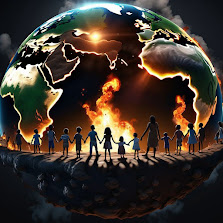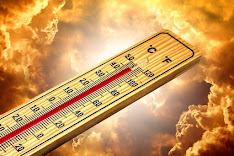HEATWAVE HORIZONS
INTRODUCTION OF HEATWAVE
A heatwave is a period of very hot weather that can be dangerous. It happens when the temperature stays very high for several days or even weeks. This can make it hard for people to stay cool and can even make them sick.HEAT LEVELS
People start to feel too hot and uncomfortable when the temperature reaches:• 32°C (90°F) - feeling hot and sweaty
• 35°C (95°F) - feeling very hot and tired
• 37°C (99°F) - heat becomes dangerous
• 40°C (104°F) - heat is extremely dangerous
HEATWAVE FACTORS
The Earth's temperature rises (global warming)• Hot air gets stuck in a place (high pressure)
• Cities trap heat (urban heat islands)
• It's very humid
• There's no rain (drought)
• There's no wind or wind brings hot air
• The Earth's temperature is rising overall (climate change)
HEATWAVE CONDITION IN PAKISTAN
Severe heatwave conditions are expected across Pakistan, especially in Sindh, until June•Temperatures in Hyderabad, Mirpurkhas, and other areas may reach 5-7°C above average.
•Heatwave conditions are expected in Karachi, Thatta, Badin, and Sujawal districts, with temperatures reaching 40-42°C in Karachi and 42-44°C in Thatta and Badin.
•A heat-wave alert has been issued, with temperatures expected to reach 46-48°C.
HEATWAVE CONDITION IN INDIAN
Here's a update on India's heatwave:
• 5 people died in Bihar due to heatstroke.
• North and central India are experiencing extreme heat.
• Temperatures in Delhi reached a record 52.9°C.
• Temperatures will slowly decrease in the next 5 days.
HEATWAVE CONDITION IN FOREIGN COUNTRIES
•South Asia: The region is experiencing an extreme heat wave, with temperatures as high as 50 degrees Celsius. Children, displaced people, migrants and those in refugee camps are especially vulnerable.•Brazil: Climate change is a significant risk multiplier contributing to displacement and protection needs in Latin America and the Caribbean.
•Philippines: The heatwave has caused crop damage and reduced yields, as well as closed schools and affected millions of students.
HEATWAVE ALERT
Heatwaves can have severe impacts on people, especially populations such as:•Older adults: Heat stress, dehydration, and heatstroke are more likely due to decreased sweat production and medications.
•Young children: Their bodies produce more heat relative to their size, and their cooling mechanisms are not fully developed.
•Outdoor workers: Prolonged exposure increases the risk of heat-related illnesses.
HEATWAVE SAFETY TIPS
Here's how to stay safe in a heatwave:1. Drink plenty of water.
2. Stay indoors during the hottest part of the day.
3. Wear light, loose clothes.
4. Use fans and air conditioners.
5. Take cool showers.
6. Avoid hard work or exercise.
7. Stay in the shade.
8. Check on vulnerable people.
9. Follow heatwave alerts and instructions.
CONCLUSION
In short, heatwaves can be very dangerous•We must take care to stay safe. Drink water, stay indoors, wear light clothes, use fans and air conditioners, and check on others. Listen to local authorities and take care of yourself and others. Stay cool, stay safe!.-----------------------***********----------------------









Comments
Post a Comment